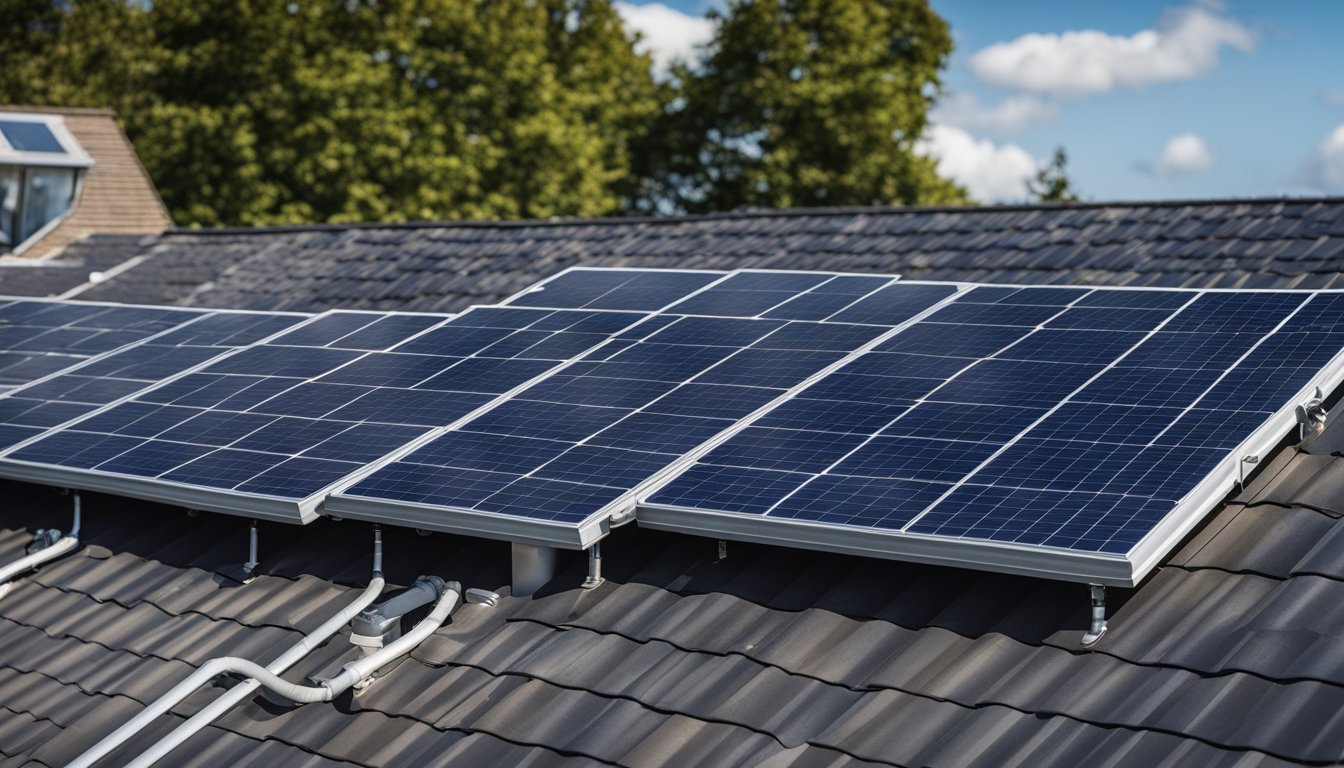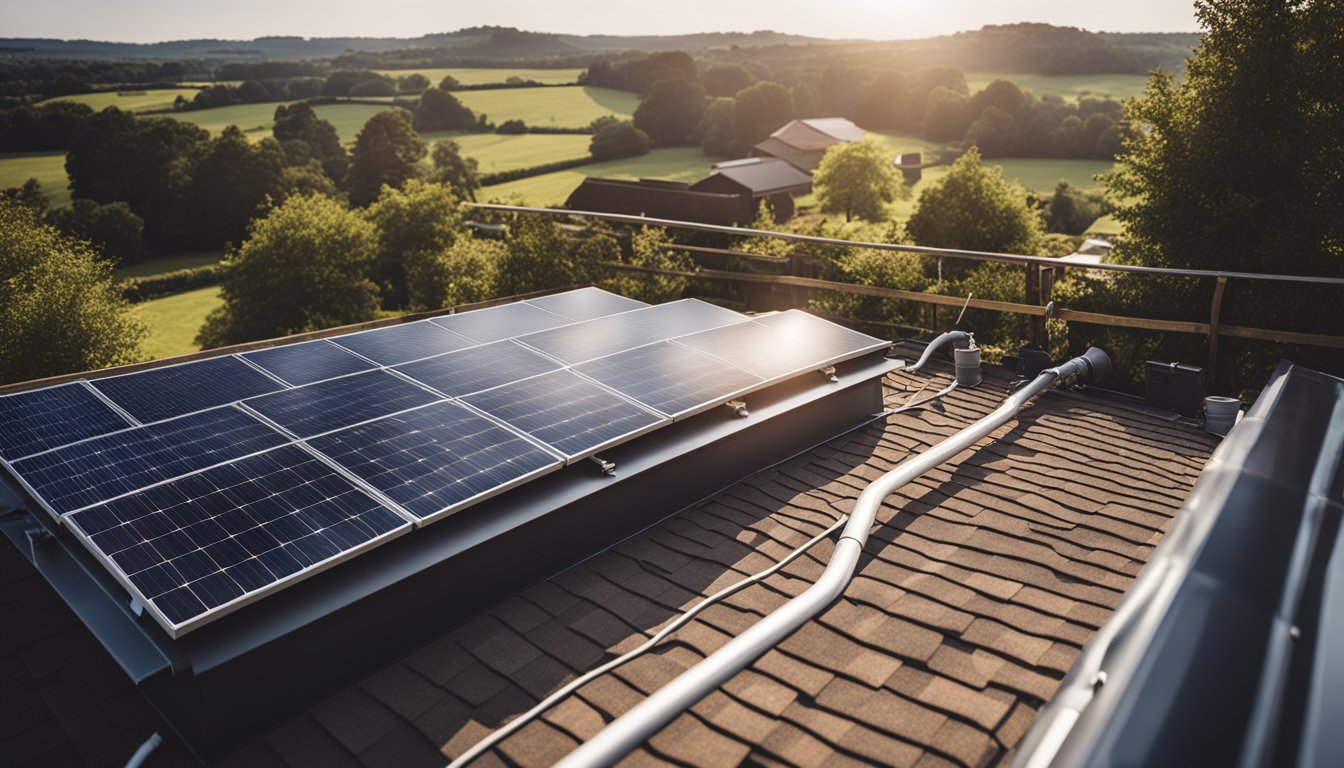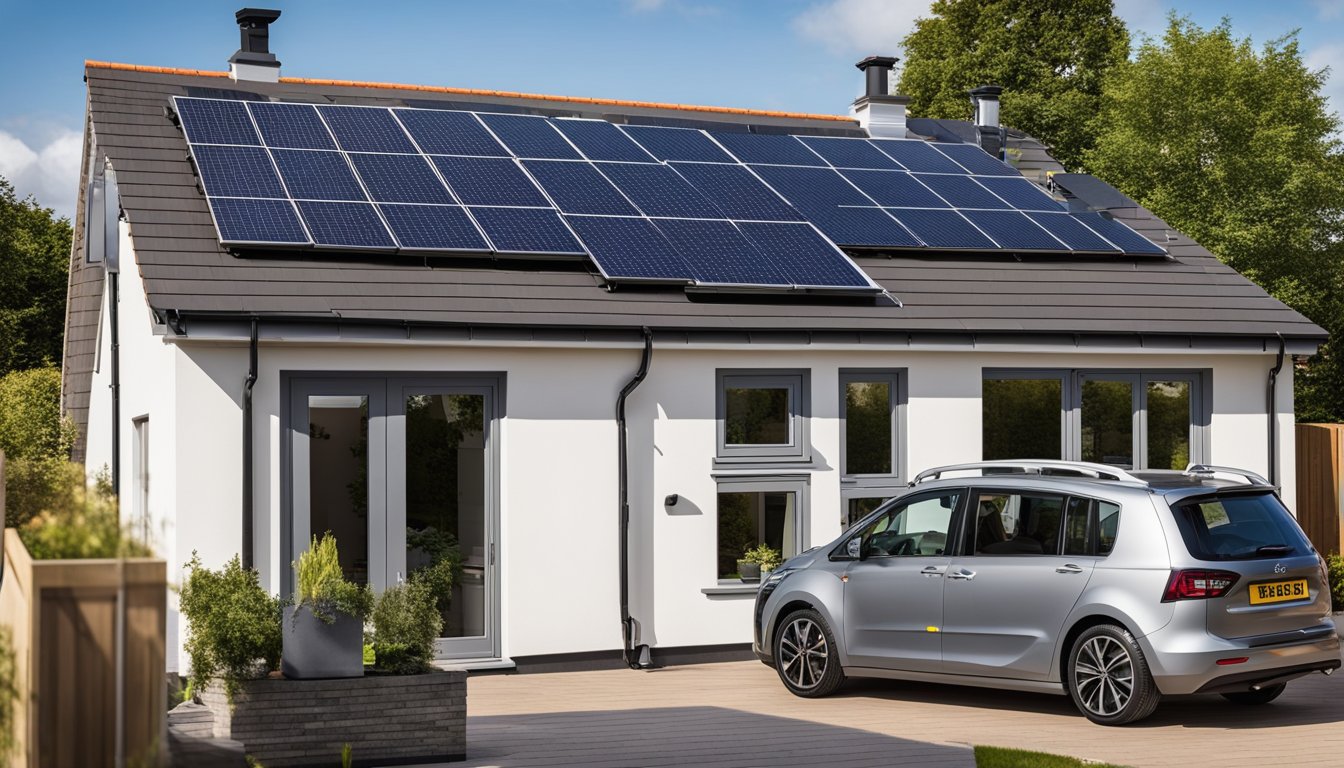Late updated: 31 Jul 2024 09:07
Written by: Eleanor Hartman
Integrating Solar Panels With Heat Pumps For UK Homes: Maximising Energy Efficiency
Utilising renewable energy sources not only reduces our environmental impact but also offers significant cost savings. Combining solar panels with heat pumps provides an eco-friendly and cost-effective solution for UK homes. This integration allows us to generate electricity from solar energy to power the heat pump, ensuring efficient heating and cooling throughout the year.

Recent advancements have made it feasible to install both solar photovoltaic panels and heat pumps in our homes, making use of the abundant, renewable solar energy available. By tapping into the electricity generated by solar panels, heat pumps work more efficiently, reducing our reliance on non-renewable energy sources and cutting down on energy bills.
Many UK households are already witnessing the benefits of this combination. Heat pumps, known for their efficiency, paired with solar panels, can significantly lower carbon emissions and provide substantial yearly savings on energy costs. The investment, while initially high, pays off in the long run with reduced utility bills and a smaller carbon footprint.
Key Takeaways
- Solar panels and heat pumps create an efficient, sustainable energy solution.
- This combination reduces energy bills and carbon emissions substantially.
- The initial investment in solar-powered heat pumps pays off over time.
Basics of Solar Panel and Heat Pump Integration
Integrating solar panels with heat pumps offers significant benefits, combining renewable energy sources to power heating systems effectively. By understanding their functionalities and benefits, we can make informed decisions for a sustainable and energy-efficient future.
Understanding Solar Panels
Solar panels capture sunlight and convert it into electricity through photovoltaic cells. This electricity can power household appliances, reducing dependence on the national grid.
For UK homes, a solar panel system of 5-6 kilowatts can generate a substantial amount of electricity, especially during sunny months. Installation costs have decreased, making solar panels more accessible to homeowners.
By producing their own electricity, households not only save on energy bills but also reduce their carbon footprint, contributing to a more sustainable environment.
The Functionality of Heat Pumps
Heat pumps extract thermal energy from the air, ground, or water and convert it into heat for home use. Air source heat pumps are popular in the UK due to their efficiency and ease of installation.
These systems work effectively even in colder climates, making them suitable for year-round use. By moving existing heat rather than generating it, heat pumps consume less electricity compared to traditional heating methods.
Combining heat pumps with solar panels can further reduce reliance on grid electricity, providing a more eco-friendly and cost-effective heating solution.
Benefits of Combining Solar Panels with Heat Pumps
When solar panels generate electricity, this can be used to power heat pumps, creating a near self-sufficient heating system. This reduces both energy bills and carbon emissions.
Using solar energy for heat production improves energy efficiency, as excess solar power generated during the day is put to good use. This integration leads to significant long-term savings by decreasing the need for electricity from non-renewable sources.
In the UK, such systems are particularly beneficial due to variable energy prices and an increased focus on reducing household carbon footprints. Combining these technologies supports a sustainable lifestyle while offering practical and economic advantages.
Implementing Solar-Powered Heat Pumps in UK Homes

Combining solar panels with heat pumps can enhance energy efficiency and offer significant savings on energy bills. We will explore important factors, from assessing your home’s suitability and selecting the right equipment to understanding costs and maximising energy savings through government incentives.
Assessing the Suitability of Your Home
Evaluating if your home can efficiently integrate solar-powered heat pumps is crucial. Roof space is a key factor—enough space must exist to accommodate the necessary solar photovoltaic (PV) panels.
Insulation levels also need to be assessed. Proper insulation ensures that the heat pump operates efficiently and minimises energy consumption. Additionally, the type of heating system in place (e.g., radiators or underfloor heating) affects compatibility and performance.
Consider your home heating requirements and current energy consumption patterns. Homes in regions with less sunshine may need supplementary solar batteries to store solar electricity for use during non-sunny periods.
Choosing the Right Equipment
Selecting the proper equipment is essential for optimal performance. There are three main types of heat pumps: air source heat pumps, ground source heat pumps, and water source heat pumps. Each has its own efficiency rating and operational costs, which should be factored into the decision-making process.
To pair with a heat pump, solar panels should be of high quality and installed by a certified installer from the Microgeneration Certification Scheme (MCS). A solar battery system can enhance energy independence by storing excess solar electricity for later use.
The heat pump’s capacity must match the size of your home. For example, a 5kW heat pump may suffice for smaller homes, whereas larger homes might need a 10kW or higher system.
Installation and Costs
Initial installation costs for solar-powered heat pumps can be considerable. Air source heat pump installations average between £9,500 and £20,000, including solar panels. Ground source heat pumps are generally more expensive due to the extensive groundwork required.
Operational costs and savings should also be contemplated. Combining solar panels with heat pumps can significantly reduce electricity bills over time. Additionally, integrating a battery storage system can further cut expenses by using stored solar power when needed.
Government Incentives and Grants
Several government grants are available to reduce the upfront cost of installing solar-powered heat pumps. The Boiler Upgrade Scheme offers grants to help households install heat pumps as alternatives to traditional boilers.
The ECO4 Scheme aims to support energy-efficient home improvements, including the installation of heat pumps and solar panels for eligible homes.
We can leverage grants such as the Renewable Heat Incentive (RHI) to offset installation and operational costs. Further support might also be available through solar panel grants and local authority schemes.
Maximising Energy Savings and Efficiency
Maximising energy savings involves more than just installation. Regular maintenance of both the heat pump and solar PV system ensures peak performance. Inspecting the insulation and verifying its effectiveness can further improve energy efficiency.
Monitoring your electricity usage and adjusting the system accordingly can lead to additional savings. Installing smart meters helps track energy consumption in real time, making it easier to optimise usage.
Additionally, upgrading to energy-efficient appliances and implementing energy-saving practices collectively contribute to lowering overall energy costs.
Frequently Asked Questions

Integrating solar panels with heat pumps in the UK offers a substantial opportunity for both energy savings and environmental benefits. Below, we address some key aspects that homeowners commonly inquire about.
What are the costs associated with installing an air-source heat pump alongside solar panels in the UK?
The combined cost of installing an air-source heat pump and solar panels typically ranges from £9,500 to £20,000. This amount varies depending on the type of system, the size of the home, and the specific installation requirements. These investments can significantly reduce energy costs over time.
Is it possible to power a heat pump entirely with solar panels in a UK home?
Yes, it is possible to power a heat pump entirely with solar panels, especially during daylight hours. For sustained efficiency, a combination of solar power and grid electricity might be necessary. This ensures consistent heat pump performance even on cloudy days.
How can solar panels and heat pumps be integrated to optimise energy efficiency in residential buildings?
Solar panels can generate electricity that powers the heat pump, reducing reliance on the grid. Systems should be sized correctly to meet the specific energy demands of the home. Effective integration involves an inverter to convert DC to AC and a controller to manage energy flow between panels and the heat pump.
Can a battery storage system be effectively combined with solar panels and a heat pump for home use?
Yes, a battery storage system can store excess solar energy generated during the day for use at night or during periods of low sunlight. This maximises self-consumption and enhances the overall efficiency of the system. It's an efficient way to ensure energy availability and reduce dependence on the grid.
What are the benefits of combining solar hot water systems with heat pumps?
Combining solar hot water systems with heat pumps can enhance energy efficiency by using solar energy to preheat water, which the heat pump then brings to the desired temperature. This reduces the energy load on the heat pump, prolongs its lifespan, and lowers the cost of hot water production.
What is involved in the process of installing a solar-assisted heat pump in the UK?
Installation involves several steps including an initial assessment, designing the system, obtaining necessary permits, and actual installation. This includes mounting solar panels, installing the heat pump, and integrating both systems. Specialists ensure that all components work harmoniously and achieve optimal performance. Regular maintenance is essential to keep the system efficient.